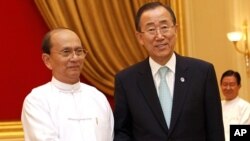United Nations Secretary-General Ban Ki-moon urged a further easing of economic and political sanctions against Burma Monday, during an unprecedented speech to the country's parliament.
Ban praised President Thein Sein for ushering in a string of dramatic and unexpected reforms since taking office a year ago.
Last week, the European Union suspended most of its sanctions, except arms sales, following the examples of Australia and Canada, while the United States maintained sanctions on trade.
The U.N. chief urged the international community to do more to support reform efforts in Burma, also known as Myanmar.
"I urge the international community to go even further in lifting, suspending, or easing trade restrictions and other sanctions," he said. "Second, Myanmar needs a substantial increase in international development assistance as well as foreign direct investment."
The U.N. chief also praised democracy leader Aung San Suu Kyi’s leadership. Her National League for Democracy Monday backed off a demand for changes to a constitutional oath required of members of parliament.
"We decided to compromise in this situation because we don't want to become a political problem. Some people may think the NLD has given in, but let them think what they want," Aung San Suu Kyi explained in response to a reporter's question about why they made the compromise.
NLD members could take the oath as early as Wednesday. The oath requires politicians to say they will “safeguard” the military-drafted constitution as they are sworn in. The NLD members opposed it because they want to amend the charter.
The constitution sets aside a quarter of all seats in parliament for the military and allows it to take over government if there is an “emergency.”
Earlier Monday Ban held meetings with President Thein Sein. Tuesday he is scheduled to meet for the first time with Nobel laureate Aung San Suu Kyi.
Ban last visited Burma in 2009 when the military government was still in power, holding Aung San Suu Kyi under house arrest, and refusing to let her see the U.N. leader.
The democracy leader was released shortly after the controversial 2010 election that brought the nominally civilian government to power.
The NLD boycotted the 2010 election because their leader was not allowed to run, but participated in April’s by-elections where Aung San Suu Kyi and 42 of her fellow NLD party members won seats.
UN Chief Encourages Further Easing of Burma Sanctions




